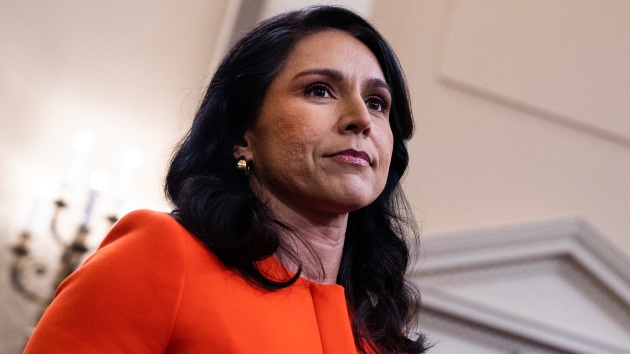
(NEW YORK) -- Director of National Intelligence Tulsi Gabbard is leading a U.S. delegation to Singapore this week to attend the Shangri-La Dialogue, Asia's premier security summit, another signal of the Trump administration's intensified focus on the Indo-Pacific region.
The summit will convene more than 550 delegates from 40 nations, including military, intelligence, business and security leaders, from across the Asia-Pacific, Europe and North America, a source familiar with plans told ABC News.
Gabbard will be joined by Defense Secretary Pete Hegseth at the 22nd annual summit, hosted by the International Institute for Strategic Studies, which runs from May 30 to June 2 in Singapore.
Gabbard is expected to "discuss major security challenges" with leaders, a source familiar with Gabbard's plans told ABC News. This year's U.S. delegation includes higher-level representation than in previous years, the source added.
The Shangri-La Dialogue is considered Asia's top defense summit, comparable to the Raisina Dialogue and the Munich Security Conference, both of which Gabbard attended earlier this year.
This trip marks Gabbard's second trip to Asia in recent weeks, seemingly reinforcing the Trump administration's renewed focus on the region.
Shortly after her confirmation, Gabbard traveled to India and met with Indian Prime Minister Narendra Modi ahead of President Donald Trump's bilateral meeting with Modi in February.
Her relationship with Modi spans more than a decade, dating back to 2013 when she became the first Hindu member of Congress. They met again during her 2014 visit to India at Modi's invitation.
Earlier this year, Gabbard accepted an invitation from Modi to speak at the Raisina Dialogue in New Delhi, a multilateral conference on geopolitics and geoeconomics, but, before returning to Washington, D.C., Gabbard made stops in Japan, Thailand and France. Her diplomatic tour began in Honolulu, Hawaii -- her hometown -- where she represented the state in Congress for eight years.
While in Hawaii, Gabbard met with intelligence community partners and visited United States Indo-Pacific Command (INDOPACOM) headquarters in Honolulu.
In Singapore this week, she will hold bilateral meetings with regional leaders to "explore opportunities to chart a path that advances mutual interests of security, peace, and prosperity in the region," according to a source familiar with the agenda.
Long before taking the helm of the intelligence community, Gabbard was already on the ground in Southeast Asia and, in 2019 while she was running for president, she paused her campaign for two weeks to serve on active duty with the U.S. Army National Guard in Jakarta, Indonesia, becoming the first candidate in modern history to do so.
Now, as director of national intelligence, her return to the region marks a shift from military service to high-stakes diplomacy, an evolution that underscores not only her long-standing personal and strategic ties to the Indo-Pacific, but also hints the administration's broader efforts to elevate U.S. engagement in the region.